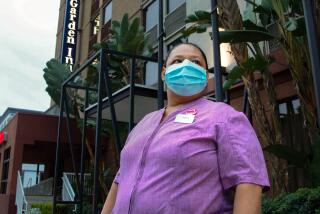Leading a Life of Grime
- Share via
A show of hands, gentlemen: Who washes their mitts after every trip to the bathroom? Oh, really? Well, I’ve got some bad news: More than a third of you are grubby-handed fibbers. In a 1996 telephone survey conducted for the American Society for Microbiology, nearly all respondents claimed that they clean up after every visit to the john. Yet, when the researchers sent brave observers into restrooms around the nation, they found that just 61% of men hit the sink after hitting the can. (Women rated better, but 1 out of 4 still slipped away without scrubbing up.)
Hand hygiene came to my attention a few days ago, when a fellow journalist called sounding highly grossed out. Earlier that day, he had looked on in horror as a co-worker emerged from a men’s room stall, the toilet gurgling behind him, and quickly exited the facility without washing his hands.
I grunted a manly note of disapproval, but inside I was thinking “Eeeuw.” Since then, I’ve repeated this story to several other friends. Each time, I’ve been regaled with similar tales of unclean office mates. One woman told me that a distinguished executive at her firm lost the esteem of his colleagues when word got around that he was a non-washer.
*
The disgust is easy to understand. You’re going to touch yourself down there and then ask to borrow my stapler? Have you no decency? But while people who bypass the sink may be inconsiderate slobs, fear that they are spreading exotic germs into the community is overblown, explains Dr. Winkler Weinberg, chief of infectious disease service at the Southeast Permanente Medical Group in Atlanta. Generally speaking, he says, people who don’t wash their hands after using a restroom are far more dangerous to themselves than anyone else.
Here’s why: Even if you’re stuck with the flimsiest single-ply toilet tissue, it’s very unlikely that any microbial beasties will get on your hands as you wipe, explains Weinberg, author of “No Germs Allowed!” (Rutgers University Press, 1996). Although we’re naturally repulsed by poop, the stuff tends to be relatively benign. In rare cases, it may contain bacteria such as salmonella or shigella, which cause food poisoning. But if you’re excreting these microbes, you’re probably no threat to the general public because you’re probably at home in bed or hospitalized, violently ill.
Meanwhile, just about anything else you touch in a busy public restroom--doorknobs, flush handles, toilet paper dispensers--is swarming with germs. Rhinoviruses, which cause the common cold, are particularly hardy bugs, says Weinberg, and can live on most surfaces for hours, even days. If a rhinovirus hitchhikes a ride on your hand when you open a door, there’s a good chance you’ll soon infect yourself, usually by touching your nose or eye.
Of course, you can pass along a cold virus through personal contact, simply by shaking hands. And, indeed, there are certain people who can and do spread more serious diseases by failing to wash their hands regularly. Ironically, some of them are the very people we turn to when we’re sick: doctors and nurses, who are constantly exposed to germs. The federal Centers for Disease Control and Prevention says that contaminated hands are the leading cause of hospital-acquired infections, which kill 80,000 patients in the United States each year.
What’s more, a recent outbreak of hepatitis A in North Carolina may have been caused by an infected restaurant worker who must not have noticed the “Employees Must Wash Hands” sign in the restroom.
*
To cut down on your own germiness, clean your hands with plenty of soap after going to the bathroom, or any other time you might come in contact with germs, such as changing a diaper; and before handling food or eating. Lather up for at least 15 seconds, working the suds between your fingers and on the tips. Regular soap is fine; antibacterial cleansers are even more effective (though some scientists worry that these popular germ-busting products are helping to produce drug-resistant strains of bacteria). Rinse with warm water. Finally, dry your hands with a paper towel, recommends Weinberg. He happens to be an advisor to the Georgia-Pacific Corp., which makes, among other things, paper towels. Tree lovers may cringe, but it’s probably not a bad idea. Cloth towels are nothing but germ rags, after all, and Weinberg cites a recent British study suggesting that microbes lingering inside restroom hot air blowers may actually recontaminate hands.
What’s more, the truly germ-conscious restroom visitor uses a paper towel to shut off the faucet and grab the doorknob when leaving. In fact, many full-blown germ-o-phobes now carry pocket-size bottles of hand sanitizer. These alcohol-based lotions, available at most drugstores, allow you to wash up when soap and water aren’t available. Warning: Excessive use can lead to dry hands, from the alcohol. And if you whip out a bottle of this stuff on a fishing trip, your hands may get clean, but your buddies will think you’ve lost your grip.
*
Timothy Gower is a Massachusetts-based freelance writer and author of “Staying at the Top of Your Game” (Avon Books, 1999). He can be reached by e-mail at tgower@capecod.net.
* The Healthy Man column runs monthly in Health.






